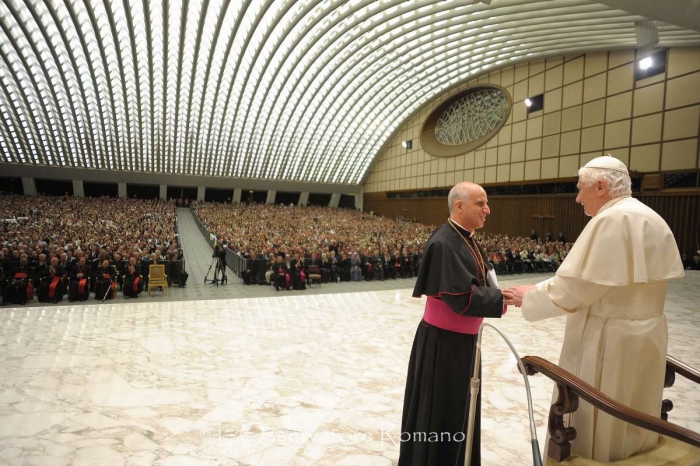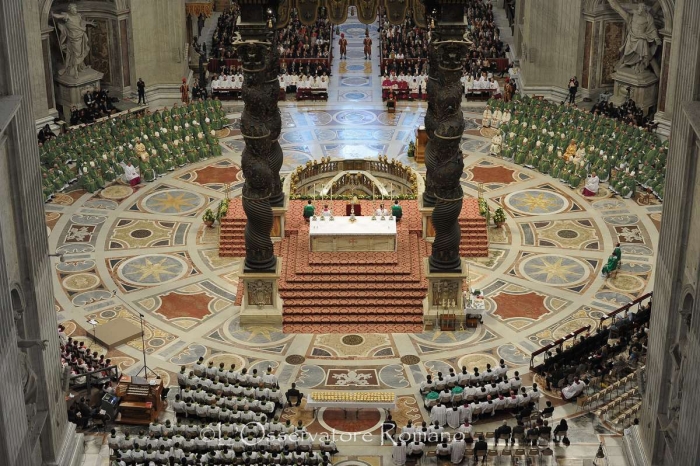ADDRESS OF THE HOLY FATHER BENEDICT XVI

MEETING WITH CHURCH LEADERS INVOLVED IN THE NEW EVANGELIZAION
ON THE OCCASION OF THE INTERNATIONAL CONFERENCE
ORGANIZED BY THE PONTIFICAL COUNCIL
FOR PROMOTING THE NEW EVANGELIZATION
[Video of the whole session - in Italian]
Your Eminences, Venerable Brothers in the Episcopate, Dear Friends,
I gladly accepted the invitation of the President of the Pontifical Council for the Promotion of the New Evangelization to be present with all of you this evening for a brief moment and, especially, tomorrow for the Eucharistic Celebration. I thank Archbishop Fisichella for the greeting he addressed to me on your behalf and I rejoice to see you in such large numbers.
I know that you are here representing a great many others who, like you, are involved in the far from easy task of the new evangelization. I also greet those who are following this event through the media, enabling many new evangelizers to be connected live, though scattered in different parts of the world.
You have chosen as the guideline for your reflection today the expression: “The Word of God grows and spreads”. The Evangelist Luke uses this formula several times in the Acts of the Apostles; indeed in various circumstances he affirms that “the Word of God grew and multiplied” (cf. Acts 6:7; 12:24). In today’s theme, however, you have changed the tense of the two verbs to highlight an important aspect of faith: the conscious certainty that the word of God is ever alive, at every moment of history, in our time too, because the Church realizes it through her faithful transmission, the celebration of the sacraments and the witness of believers. For this reason our history is in full continuity with that of the first Christian community and is nourished by the same life-giving sap.
But what soil received the word of God? As then, so today too it can encounter closure and rejection, ways of thinking and living that are far from the search for God and for the truth. People of today are often confused and fail to find an answer to the many questions that torment the mind on the meaning of life, and to the queries that are lodged in the depths of their heart. Human beings cannot escape these questions that touch on the meaning of self and reality, they cannot live in one single dimension! Instead, they are often distanced from the search for the essential in life while an ephemeral happiness is proposed to them that is briefly satisfying but soon gives way to sadness and dissatisfaction.
Yet, despite the condition of people today, we can still say with certainty, as in the early days of Christianity, that the word of God continues to grow and to spread. Why? I would like to mention at least three reasons. The first is that the power of the word does not depend above all on our action, on our means, on our “doing”, but rather on God, who hides his power behind signs of weakness, who becomes present in the gentle morning breeze (cf. 1 Kings 19:12) and is revealed on the wood of the cross. We must always believe in the humble power of the word of God and let God act!
The second reason is because the seed of the word, as the Gospel Parable of the Sower recounts, still falls on good soil that welcomes it and produces fruit (cf. Mt 13:3-9). And the new evangelizers are part of this field enabling the Gospel to grow in abundance and transform their life and the lives of others. In the world, even if evil makes more noise, good soil continues to exist.
The third reason is that the proclamation of the Gospel has truly reached the ends of the earth and, even amidst indifference, misunderstanding and persecution, many, still today, continue courageously to open their hearts and minds to accept Christ’s invitation to meet him and to become his disciples. They make not a sound but are like the tiny mustard seed that becomes a tree, the leaven that causes the dough to rise, the grain which breaks open to bring forth an ear of wheat. If on the one hand all this brings comfort and hope because it shows the ceaselessly active missionary leaven that gives life to the Church, on the other it must fill everyone with a renewed sense of responsibility to the word of God and the spread of the Gospel.
The Pontifical Council for the Promotion of the New Evangelization, which I established last year, is a precious means for identifying the great questions that are troubling the various sectors of today’s society and culture. It is called to offer special help to the Church in her mission and above all in those countries with an ancient Christian tradition that seem to have become indifferent, if not actually hostile to the word of God. Today’s world needs people who proclaim and testify that it is Christ who teaches the art of living, the way of true happiness, because he himself is the path of life; people who first of all keep their own gaze fixed on Jesus, the Son of God: the word of proclamation must always be immersed in an intense relationship with him, in an intense life of prayer. Today’s world needs people who speak to God, so as to be able to speak of God. And we must always remember that Jesus did not redeem the world with beautiful words or ostentatious means but with his suffering and his death.
The law of the grain of wheat that dies in the ground also applies today; we cannot give life to others without giving our own life: “whoever would save his life will lose it; and whoever loses his life for my sake and the gospel’s will save it”, the Lord tells us (Mk 8:35). In seeing all of you and knowing the great commitment that each one of you dedicates to serving the mission, I am convinced that the new evangelizers will be increasingly multiplied to give life to a real transformation which the world today needs. It is only through men and women moulded by God’s presence that the word of God will continue its journey in the world, bearing its fruit.
Dear friends, being evangelizers is not a privilege but a commitment that comes from faith. To the question the Lord addresses to Christians: “Whom shall I send and who will go for us?”, answer with the same courage and the same trust as the Prophet: “Here am I! Send me” (Is 6:8). I ask you to let yourselves be formed by God’s grace and to respond in docility to the action of the Spirit of the Risen One. Be signs of hope, able to look to the future with the certainty that comes from the Lord Jesus, who conquered death and gave us eternal life. Communicate the joy of faith to all with the enthusiasm that comes from being driven by the Holy Spirit, because he makes all things new (cf. Rev 21:5), trusting in the promised that Jesus made to the Church: “and lo, I am with you always, to the close of the age” (Mt 28:20).
At the end of this day let us also ask for the protection of the Virgin Mary, Star of the New Evangelization, as I warmly accompany each one of you and your undertaking with my Apostolic Blessing. Many thanks.





